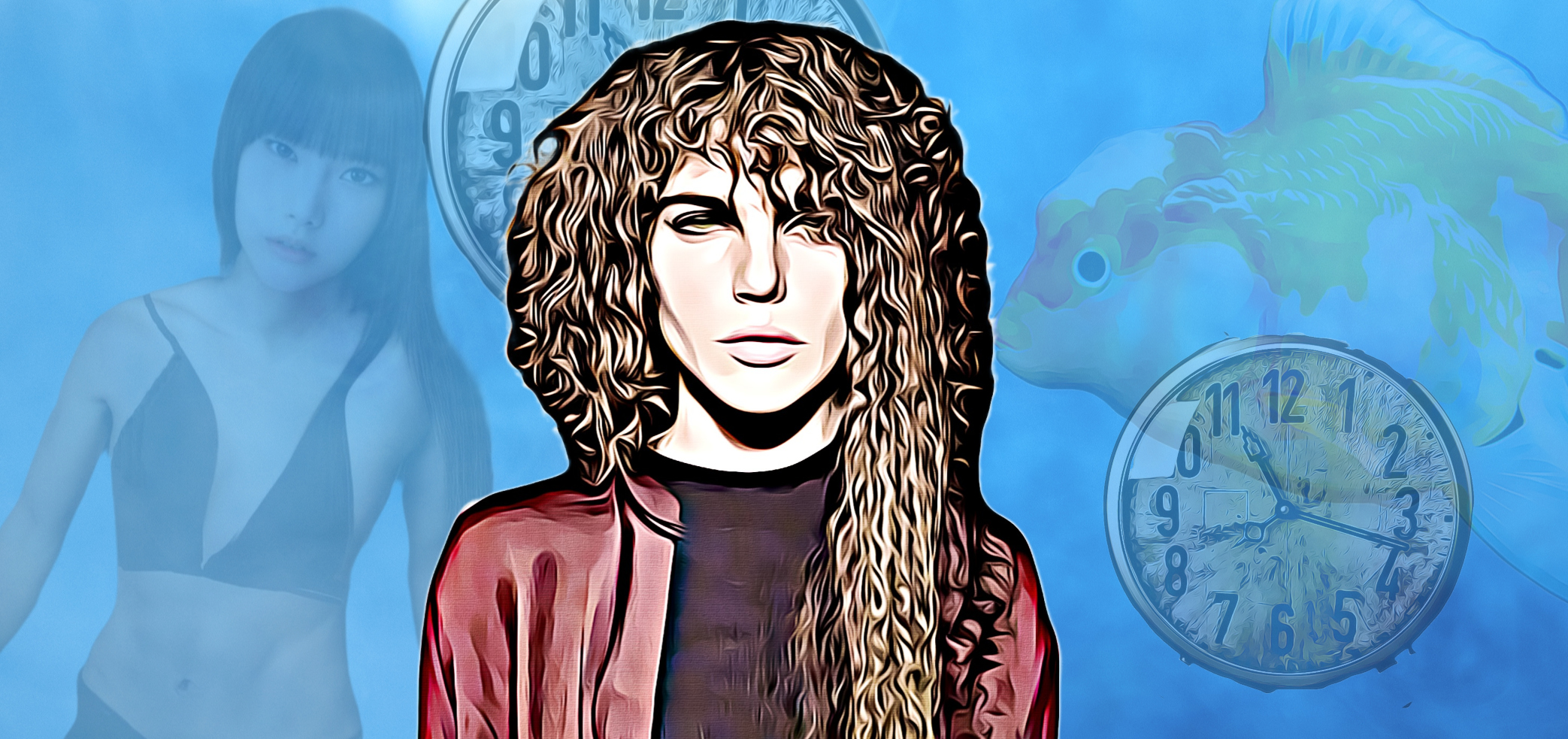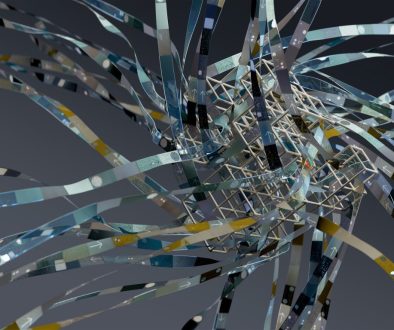Anomaly, Episode 3: Hypothesis
[Editor’s Note: Read the Story from the Beginning]
Inside his lush accommodations on the TellusCorps war ship Encounter, Natius realized that there was more to this strange adventure than Lieutenant Sasso had let on.
Pretty luxurious, he thought.
It reminded him less of a battle cruiser than of a plush resort hotel. Unfortunately, his room décor wasn’t the strangest thing about this adventure. On arrival, he was first introduced to Commodore Stetson, then to a type of alien he’d never seen in person before.
“Natius Tomlin,” the Commodore had said. “I’d like you to meet Zillnet Jolion, the Ghilostri ambassador.”
Natius gazed over at a blue-tinted, stainless-steel cylinder mounted on a base of four robotic legs that reminded him of a large insect. On top of the cylinder sat a clear tank filled with a yellowish liquid, in which swam a dark blue, nearly spherical creature with bulbous eyes reminiscent of a terrestrial black goldfish.
Though Natius suppressed the urge to stick out his hand, the Ghilostri opened a small hatch on its tank and extended a mechanical hand of its own. This was followed by a ritual greeting Natius was even more startled to hear in his mind, in perfect CommonSpeak
Commodore Stetson read the expression on his face and smiled.
“The ambassador is telepathic,” he said.
“Thought that was … was a myth,” said Natius. “I mean, that anyone could….”
The alien spoke in a crisp, cultured voice:
“Believe that Nature is as wide as it is deep. And, as to the question hovering in your mind, know that my species is, as you would say, ‘asexual.’ We reproduce by no means you would understand.”
“Thanks … thanks for sharing that,” said Natius. “Does your species like music?”
The Commodore chuckled again.
“We’ll be off now,” he said. “Our mission is time-sensitive. Look forward to hearing you this evening.”
Weeks later, Natius would think back on the expression “time-sensitive” with some bitterness. At that moment, Quincy Seikes, Natius’ drummer, approached without warning, and he lost all interest in the Commodore’s cryptic comment.
Not for the first time, Natius envied Quincy’s effortless good looks. Between high cheekbones, unblemished skin, deep blue eyes and a lanky build that made him look more athletic than he actually was, the drummer was undeniably charismatic. At the same time, the faint twang in his voice was strangely disarming.
“Do you believe this?” asked Quincy.
Natius assumed he was referring to the Encounter’s luxurious accommodations. In fact, the drummer’s relaxed, breezy banter had persuaded a few of the younger crew members to break protocol and reveal quite a lot about the Commodore’s “secret” mission. Quincy was also, it turned out, an accomplished snoop.
“Dude, what’s a ‘Time Distortion Matrix’?” asked Quincy. “I heard these two aliens talking to that Stetson guy.…”
“Commodore Stetson?” asked Natius.
“Right. Keep forgetting we’re in a war machine,” said Quincy. “Anyway, Stetson asked them if they were gonna use superstrings and I swear they were laughing at him. And hey, what’s a superstring?’
“You’re asking me?” asked Natius. “Look, you’re better off not bugging the soldiers. They’re all kinda nervous.”
“Yeah, OK,” said Quincy. “Anyhow, the Commodore dude kept asking about superstrings and the alien said they don’t deal in human mythology. Craters, what a burn!”
Natius’ throat went dry.
“Do us both a favor,” he said. “Don’t repeat that to anybody else. We don’t want to end up on the no-fly list. Or the no-work list. Or the no-freedom list. Understand?”
“Yeah,” said Quincy. “Guess it’s not so funny after all.”
“Oh, it’s funny,” said Natius. “Funny weird. If the Ghilostri are messing around with Time, we could end up in a … well, it won’t be good.”
“You think the … like the … experiment will work?”
“Better hope it does,” said Natius. “Now come on, I gotta figure out a way to play ‘Star Love’ for the nine billionth time without going out of my mind.”
He clapped his drummer on the back and nodded toward the outer corridor, toward the spacious rehearsal room that Lieutenant Sasso had provided for “Second Meson.” They hadn’t walked two meters before Natius was accosted by a member of the Ghilostri research team. Unlike Ambassador Jolion, however, this alien’s tank sported multiple appendages each of which ended in a different tool.
“Mr. Tomlin,” s/he said. “A word, please, if you are not too busy.”
Natius nodded at Quincy.
“Go get warmed up, then call the guys and Julie. I’ll catch up with you soon as I can.”
Quincy’s face fell. He gave Natius a knowing half-smile and turned away down the corridor.
“I see I have arrived at an inopportune time,” said the Ghilostri. “My apologies. My name is Camilan Draxilet and I wonder if you could answer a few questions about the human species.”
Natius rubbed the back of his neck.
“Wow,” he said. “You might want to speak to one of the physiobots or Dr. Morison, the ship’s Psyche director. “What I don’t know about ‘the human species’ … it’s enough to fill up an entire database by itself.”
The Ghilostri’s tank produced a disturbing imitation of a human laugh, that sounded like squeaky chalk on a dry blackboard.
“Very amusing,” s/he said. “What I want to explore is the human species’ relationship to music. It is called, I’m told, The Art of Time, is it not?”
“I guess I read that somewhere once,” said Natius. “Trouble is, I don’t know what it means. There’s counting and stuff in music, Still, I don’t think of it as….”
“What I am curious about,” said the alien, “is a particular sensation I have read about in the scientific literature. Our researchers have observed that when humans listen to music, their perception of Time shifts, is that not so?”
Natius’ eyes narrowed. What, he wondered, was the alien getting at? Everybody knew what it felt like when a piece of music “carried them away,” and they lost track of time. Could that be real, though?
“We … we sometimes forget to look at our chronographs, I guess,” he said. “I can’t say anybody actually believes … you know … that they stepped out of Time. I mean, as soon as the music stops, we know exactly where we are.”
“But not while the music is playing?” asked Camilan. “At most, a handful of other species that we have encountered experience this phenomenon. It is the reason that the music produced by the majority of sentient cultures is far shorter than human music. Am I correct to believe there are even artistic products lasting up to four of your standard temporal units, which combine music and theatre?”
Though Natius explained that Camilan was referring to music dating back to the pre-interstellar era, he had to admit that some of his own concert sets were quite extended.
“Fascinating,” said Camilan. “We are exploring the idea that a piece of human music, when written to our exact specifications might amplify the time-distorting effects of music on the human mind. We will then analyze those patterns and attempt to mimic them with patterns generated by microgravity wave pulses overlaid with sonic waves. If we deliver them with specially crafted space probes, I believe such pulses would disrupt local Time in a more concrete way.”
“Are you….” said Natius. “Are you sure that’s a good idea? I mean, doesn’t my heart work like a … like a timer? Wouldn’t. I dunno, turning off Time kind of kill me?”
“Undoubtedly,” said the alien, “if we proceeded as you imagine. We have something else in mind, which is purely hypothetical. Right now, we are merely gathering data. I wonder if you would be willing to assist in that process.”
Natius shrugged.
“OK,” he said. “As long as it doesn’t interfere with my performance schedule for the Commodore. What’s this about?”
If the Ghilostri swimming in its tank’s yellowish fluid had had a mouth in the usual sense, it might have smiled. As it was, Camilan extended a robotic arm and gave the human’s shoulder a gentle squeeze. S/he explained that Natius would be asked to play any music he chose on his Oscillot while Ghilostri technicians recorded him with a variety of instruments, most importantly, a device to measure his brainwave patterns.
“It would involve wearing a bit of light headgear, which we believe would not be uncomfortable for you.”
Natius caught a glimpse of the horizontal chronograph stuck to the wall at his right.
“Let me think about it,” he said. “I’m so late for rehearsal, that I’ll have to pay my band overtime.”
“Overtime?” asked the alien.
Natius nodded and ran off, relieved to be free of the Ghilostri’s eerie machine voice.
Probably should say no, he thought.
And yet, as he entered the rehearsal space, to the friendly catcalls of his bandmates, he couldn’t a mix of flattery and intrigue washed over him. Whatever else Camilan’s experiments yielded, they would break him out of his rigid routines. After nearly five years of club dates, rehearsals, news net promos — and his doomed attempts to find a lover — this otherworldly adventure would be a welcome change.
To be continued…. Read the next episode here
A new Episode of Anomaly appears every other Monday.
^^^
Mark Laporta is the author of Probability Shadow and Entropy Refraction, the first two novels in the science fiction series, Against the Glare of Darkness, which are available at a bookstore near you, on Amazon and at Barnes & Noble. He is also the author of Orbitals: Journeys to Future Worlds, a collection of short science fiction, which is available as an ebook.
Image design: Steven S. Drachman. Scowling woman: Kalyee Srithnam.




Anomaly, Episode 2: Con Artist - AUDERE MAGAZINE
April 25, 2022 @ 1:35 am
[…] To be continued…. Read the next episode here. […]